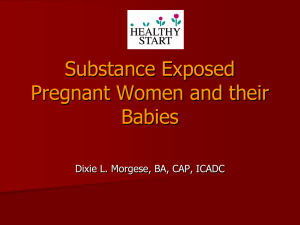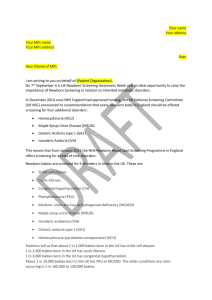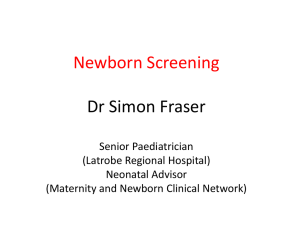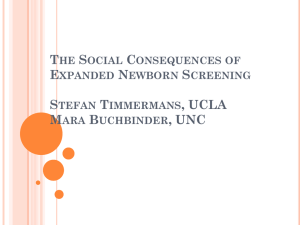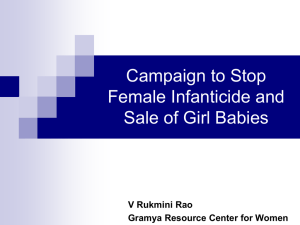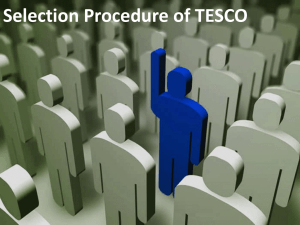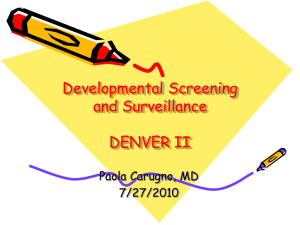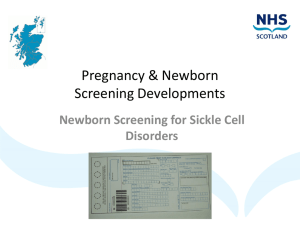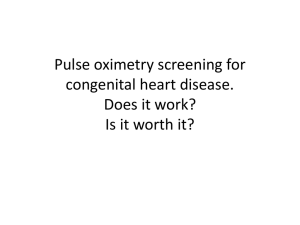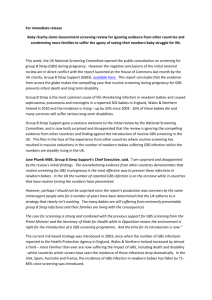UK Newborn Blood Spot Screening: Guthrie Test Overview
advertisement
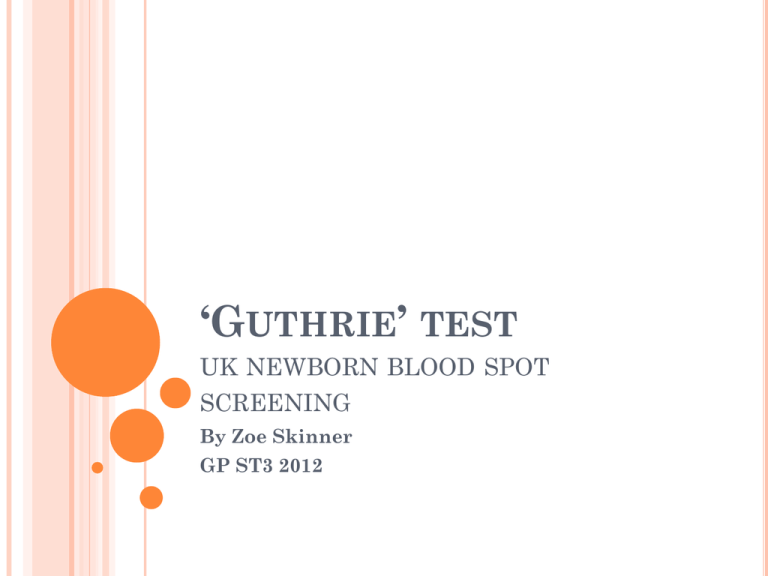
‘GUTHRIE’ TEST UK NEWBORN BLOOD SPOT SCREENING By Zoe Skinner GP ST3 2012 INTRODUCTION A blood test to screen for potentially treatable genetic conditions Introduced 1963 by Robert Guthrie in Scotland, nationally 1969. Filter paper onto which 4 spots require drops of newborn babies’ blood are collected Day 5-8 collection. Heel prick by Midwife/Health Visitor and sometimes doctor (Paediatrics) INTRODUCTION CONTINUED Prepaid envelope, sent on day of collection Sent to specialist pathology labs - for consistency & accuracy. Not compulsory but recommended Screening is not 100% accurate Result should be known by 6-8weeks (if clear or carrier) **CAN PREVENT SERIOUS DISABILITY & EVEN DEATH** PARENTS WHO DECLINE SCREENING Record reason for each condition declined or the whole thing Enter details on card and mark card as ‘decline’ and send to screening laboratory GP or Health Visitor should be informed of parent(s)’ decision They should be provided with information or contact should the change their minds SPECIAL CIRCUMSTANCES If no recorded evidence of screen, older babies up to 12months who become the responsibility of the provider organisation should be offered screening (UK Newborn Screening Centre) Neonatal units & preterm babies If admitted to neonatal unit &<5days old or if having a transfusion-need to complete a single spot ‘pretransfusion card’ as well as the other 4 spots at day 5 If transfused whilst intrauterine or in the newborn period before day 5 blood spot , repeat sample needed 72hours after transfusion. If less than 32 weeks-need card at 5 days and second sample (two spots) to be taken at 28days or before discharge, marked ‘CHT preterm’ DISORDERS SCREENED CONGENITAL HYPOTHYROIDISM CYSTIC FIBROSIS PHENYLKETONURIA (PKU) SICKLE CELL ANAEMIA -2005 MEDIUM CHAIN ACYL Co-A DEHYDROGENASE DEFICIENCY (MCADD) – 2009 More rare conditions have been considered and offered in some countries e.g. Congenital adrenal hyperplasia, Galactosaemia, Bilary Atresia, Glutaric aciduria type 1, Biotinidase deficiency. Some of which the incidence it too low to justify screening although may be beneficial if detected. Or the outcome is still poor despite preventing mortality Taken from Newbornbloodspot.screening.nhs.uk PKU About 1 in 10,000 babies in the UK Unable to metabolise phenylalanine in food Untreated serious mental disability Special diet to lead normal life Early diagnosis & treatment reduces risk of neurological handicap from 80-90% to 6-8% If thought to have it, parents contacted before 3 weeks and given appointment to see specialist CONGENITAL HYPOTHYROIDISM (CHT) 1 in 4,000 babies in the UK Affects growth, and can develop serious, permanent and physical and mental disability Treatment: Thyroxine replacement Parents contacted before 3 weeks and referred to specialist SICKLE CELL ANAEMIA (SCD) About 1 in 9,000 babies born in UK Inherited disorder affecting red blood cells Sickle cell shape can become stuck in small blood vessels and cause pain, damage, serious infection and death Screening early treatment, including immunisations & antibiotics. Parent education. The screen identifies babies who are genetic carriers of sickle cell or other unusual red blood cell disorders. Parents contacted before 6 weeks old CYSTIC FIBROSIS (CF) About 1 in 2,500 babies born in UK Inherited Affects digestion and lungs May not gain weight & frequent chest infections Treated early with high energy diet, medicines and physiotherapy They still may become very ill but early treatment is thought to help them live longer & healthier lives. The screen can also pick up carriers, look for most common gene alterations. Parents contacted before 4 weeks old MCADD About 1 in 10,000 babies born in the UK Inherited Problems breaking down fats to make energy in the body Special diet & ensuring eat regularly Can become suddenly and seriously ill Parents contacted before 3 weeks and referred to specialist THALASSAEMIAS Rarely other conditions such as beta thalassaemia major can be identified. Babies don’t produce enough red blood cells and need treatment for severe anaemia. WHAT HAPPENS TO THE BLOOD SPOTS?? Stored for at least 5 years May be used: To check the result or for other tests recommended by the doctor To improve screening programme For research & monitoring by Public Health in the UK. They will not identify baby and will not contact families. ‘No research contact’ should be recorded clearly on the card if families wish not to be involved in research. CONCLUSION One of the largest screening programmes in the UK Over 700,000 newborns are screened each year Successful and more than 99% of the babies each year are screen REFERENCE www.rcpath.org Newbornbloodspot.screening.nhs.uk www.patient.co.uk/doctor/NewbornScreening.htm
